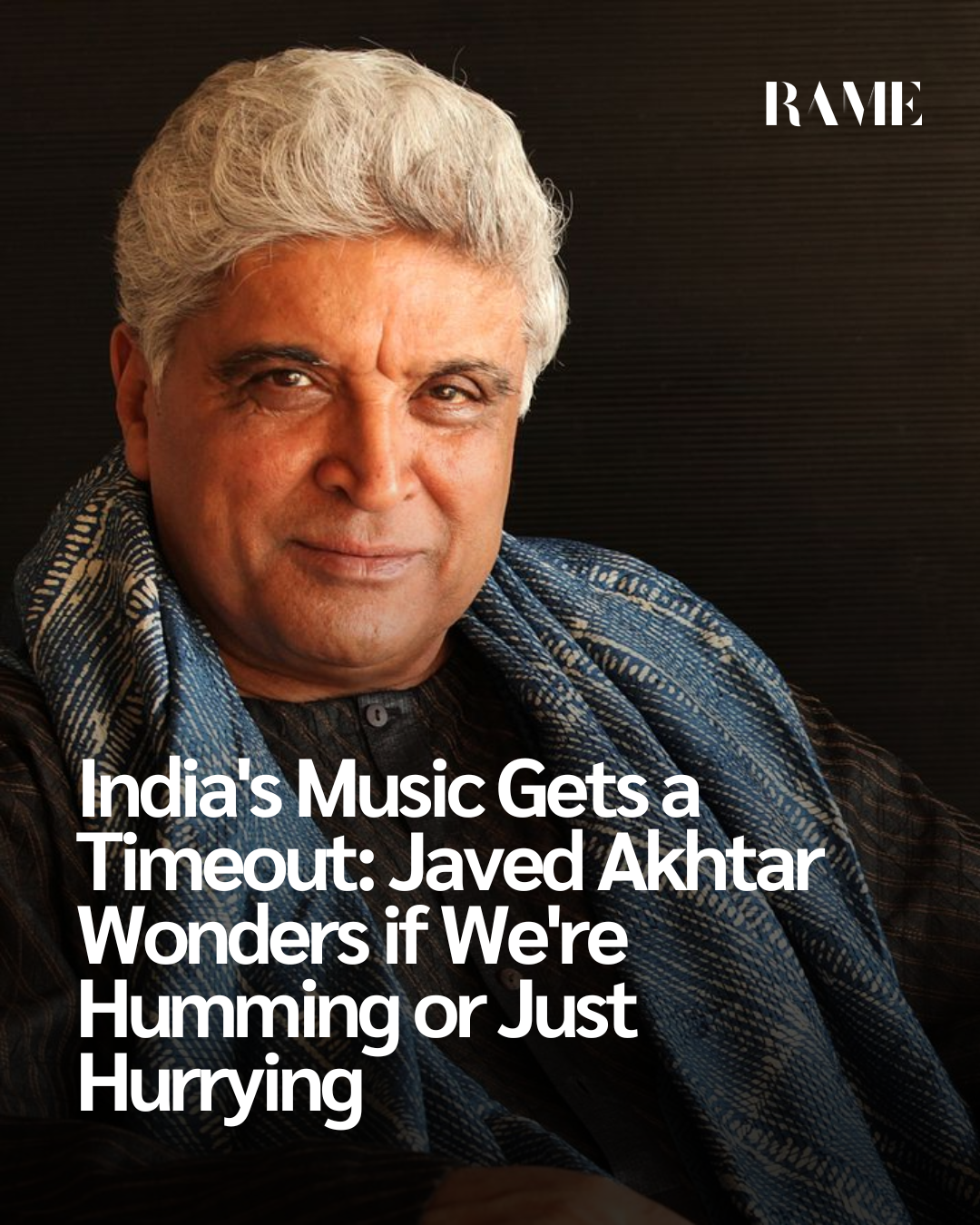Renowned lyricist and screenwriter Javed Akhtar, one of the most iconic voices in Indian cinema, recently offered a thought-provoking critique of the evolving state of Indian music. Speaking at a public event alongside filmmaker Imtiaz Ali, Akhtar reflected not just on the current trends shaping the country’s soundscape, but also on the deeper cultural shifts that those trends suggest.
In an era of rapid globalization and musical fusion, Akhtar’s concerns cut to the core of India’s musical identity. At the heart of his commentary lies a worry: that India’s rich, emotionally resonant musical heritage is slowly being overshadowed by a preference for Western musical stylings styles which, ironically, are not even in vogue in the West anymore.
“India Is a Country of Singers”
Akhtar drew a powerful distinction between how music is perceived and practiced in the West versus in India. “In the West, music is made to be heard. There, the common man doesn’t sing,” he explained. “But India is a country of singers. Our connection to music is different.”
This seemingly simple statement encapsulates centuries of tradition where music in India was not just a form of entertainment, but an intrinsic part of life itself woven into ceremonies, social rituals, festivals, spiritual practices, and daily routines. From bhajans sung in temples to folk tunes echoing in the countryside, music in India has long been a participatory experience, not just a performance to be consumed.
But, Akhtar argued, that culture is now being diluted. “Today, we’re creating music that isn’t really needed. That’s why true music is disappearing.”
Echoes of Lata Mangeshkar: “Now, Music Gets Some Rest”
To underscore his point, Akhtar quoted the legendary singer Lata Mangeshkar, who once wittily remarked, “Earlier, music was made to give singers some rest. But nowadays, music is such that music gets some rest.” The remark, both poetic and piercing, reflects a broader sentiment shared by many veterans of the Indian music industry that today’s compositions prioritize rhythm, beats, and digital enhancement over melody, lyricism, and emotional depth.
Akhtar lamented that many of today’s musical productions feel mechanical, lacking the soul that once defined Indian music. He observed how children appearing on modern singing reality shows overwhelmingly choose to perform songs from 30 or 40 years ago songs from a different era, written and composed with enduring lyrical and musical values.
“Kids come to singing shows and they sing 40-year-old songs, not those which were released a few days ago,” he said. For Akhtar, this is a telling indicator: if the music of today doesn’t inspire the next generation of singers, what does that say about its staying power?
Western Influence and the Irony of Preference
Another critical point Akhtar raised was the growing fascination with Western music in India even when the same Western genres and trends are on the decline in their own countries. He questioned why Indian audiences and, by extension, composers and producers seem to prefer certain Western styles that even Western audiences have begun to move away from.
The implication here is profound. India, with its robust musical traditions and immense creative talent, risks trading its originality and soul for borrowed aesthetics that may not even resonate globally anymore. The result, according to Akhtar, is a growing body of music that is “not needed,” both culturally and artistically.
On Diljit Dosanjh and the Hania Aamir Controversy
Shifting gears, the conversation also touched on a recent controversy involving singer-actor Diljit Dosanjh. The actor has come under fire for casting Pakistani actress Hania Aamir in his upcoming film Sardaar Ji 3. Critics questioned the decision amid ongoing tensions between India and Pakistan, prompting public discourse around art, nationalism, and responsibility.
Akhtar came to Dosanjh’s defense, calling the backlash unwarranted. “How was he to know? Pakistan won’t lose money over this our own countryman will. Laws can’t be applied retrospectively,” he said. He urged the Censor Board and the government to consider the situation with compassion and pragmatism. “They can say it shouldn’t happen again, but punishing this now isn’t fair.”
In his eyes, it’s unreasonable to penalize an artist for decisions made prior to political escalations. Art and cinema, after all, are planned months and sometimes years in advance. Retrospective judgment not only disrupts artistic freedom but also undermines the livelihoods of many professionals involved in the production process.
Imtiaz Ali Backs Diljit: “He’s a Son of the Soil”
Also present at the event, acclaimed filmmaker Imtiaz Ali voiced his support for Diljit Dosanjh, calling him “a patriot at heart.” While Ali refrained from commenting directly on the controversy, he made it clear that Dosanjh’s commitment to the country was unquestionable. “At all his concerts, he proudly waves the Indian flag,” Ali noted. “He’s not someone who pretends.”
Ali’s remarks provided a nuanced counterpoint to the charged political rhetoric surrounding the issue. They highlighted the importance of judging artists not by isolated controversies, but by their body of work, intentions, and consistent actions.
Between Commerce, Culture, and Creativity
The discussion between Akhtar and Ali speaks to a broader tension at play in India’s music and film industries: the push and pull between tradition and trend, commerce and culture, nationalism and globalism.
In Akhtar’s view, the Indian music industry must strike a better balance. There is nothing wrong with incorporating global influences after all, art thrives on fusion and evolution but not at the cost of erasing one’s own identity.
His comments serve as both a critique and a call to action: for musicians to go beyond momentary hits, for producers to back soulful compositions, and for audiences to demand substance over surface.
A Glimpse Into What’s At Stake
India’s music scene has never lacked talent. From the classical compositions of Ravi Shankar and the spiritual ballads of Nusrat Fateh Ali Khan, to the lyrical genius of Gulzar and the universal appeal of A.R. Rahman, the country has produced musical icons whose work transcends borders and generations.
But as Akhtar warns, the new wave of music must not lose touch with its roots. The danger lies in becoming so enamored with what is “trending” globally that we forget what makes Indian music truly unique its emotional honesty, lyrical depth, and participatory spirit.
When children prefer old songs over new, it’s not nostalgia it’s a silent critique. And when musicians start creating for charts instead of hearts, we may end up with a loud industry, but not necessarily a lasting legacy.
Reclaiming the Musical Soul
Javed Akhtar’s reflections offer a timely reminder that music is more than just entertainment. It is an expression of identity, history, and collective emotion. As India stands at the crossroads of modernity and heritage, artists, creators, and audiences alike must ask: are we making music to remember or just noise to forget?
The answer, perhaps, lies in reclaiming the values that once made Indian music unforgettable and ensuring they resonate for generations to come.



